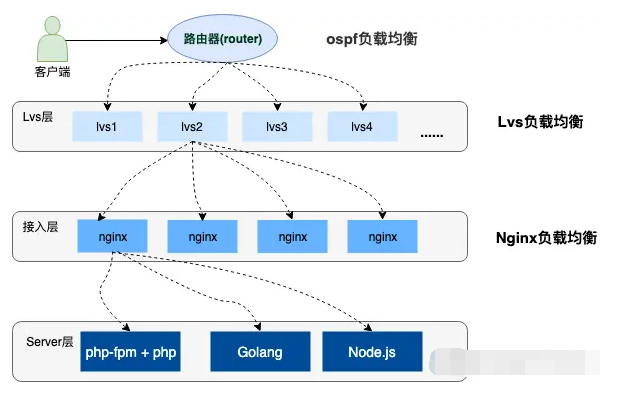 Backend Development
Backend Development PHP Tutorial
PHP Tutorial Application cases of PhpFastCache in high concurrency environment
Application cases of PhpFastCache in high concurrency environmentApplication cases of PhpFastCache in high-concurrency environments
Introduction:
With the rapid development of the Internet, the number of concurrent visits to the website is also getting higher and higher. In the case of high concurrency, the website may face many problems, such as performance degradation, extended response time, etc. In order to solve these problems, we need to choose an efficient caching system. This article will introduce the application cases of PhpFastCache in high concurrency environments and provide relevant code examples.
What is PhpFastCache?
PhpFastCache is a simple and efficient caching library that can help us easily add caching functionality to PHP applications. It supports a variety of cache backends, including files, Memcache, Redis, etc., which improves application performance by reducing database queries and repeated calculations.
Case background:
Suppose we have an advertising display website, and there are a large number of advertising requests every day. Each ad request requires querying advertising information from the database, performing a series of processing and calculations on the ad, and finally returning it to the user for display. Due to the high volume of ad requests, this process can overload the database and result in longer website response times.
Solution:
In order to optimize website performance, we can use PhpFastCache to cache advertising data. When there is an ad request, first try to get the ad data from the cache. If it is not in the cache, query it from the database and store the results in the cache. This way, the next time an ad is requested, the data can be fetched directly from the cache without querying the database again.
Code sample:
The following is a simple sample code that demonstrates how to use PhpFastCache to cache advertising data in a high-concurrency environment.
<?php
// 引入PhpFastCache库
require_once('phpfastcache/phpfastcache.php');
// 创建缓存对象
$cache = phpFastCache();
// 设置缓存键名
$key = 'ad_data';
// 尝试从缓存中获取数据
$result = $cache->get($key);
// 如果缓存中没有数据
if ($result === null) {
// 从数据库中查询广告数据
$adData = queryFromDatabase();
// 将广告数据存入缓存,并设置过期时间为5分钟
$cache->set($key, $adData, 5 * 60);
// 使用查询到的广告数据进行处理和计算
processAdData($adData);
// 返回广告数据给用户展示
echo $adData;
} else {
// 直接使用缓存中的数据进行处理和计算
processAdData($result);
// 返回广告数据给用户展示
echo $result;
}
// 从数据库中查询广告数据的函数
function queryFromDatabase() {
// ... 从数据库中查询广告数据的逻辑 ...
}
// 处理和计算广告数据的函数
function processAdData($data) {
// ... 处理和计算广告数据的逻辑 ...
}
?>In the above code example, we first create an instance of PhpFastCache, and then use the get() method to try to obtain advertising data from the cache. If there is no data in the cache, call the queryFromDatabase() function to query the data from the database and store the results in the cache. Finally, we use the processAdData() function to process and calculate the advertising data and return it to the user for display.
Conclusion:
By using PhpFastCache to cache advertising data in a high-concurrency environment, we can greatly improve the performance of the website, reduce the database load, and reduce the response time. PhpFastCache is easy to use and supports a variety of cache backends, which can be configured according to actual needs. In actual applications, we can choose an appropriate cache backend based on specific circumstances to improve application performance and scalability.
References:
- PhpFastCache official documentation: https://www.phpfastcache.com/
- StackOverflow: https://stackoverflow.com/
The above is the detailed content of Application cases of PhpFastCache in high concurrency environment. For more information, please follow other related articles on the PHP Chinese website!
 高并发有哪三种解决方法?Jun 28, 2021 pm 03:37 PM
高并发有哪三种解决方法?Jun 28, 2021 pm 03:37 PM高并发三种解决方法是:1、系统拆分,将一个系统拆分为多个子系统;2、缓存,所有现代计算机系统发挥高性能的重要因素之一;3、MQ(消息队列),基础数据结构中的“先进先出”的一种数据机构。
 go语言支持高并发的原因是什么Dec 20, 2022 am 10:31 AM
go语言支持高并发的原因是什么Dec 20, 2022 am 10:31 AM原因:go语言在设计的时候从关键字层面实现了多协程开发。go语言实现了CSP并发模型做为并发基础,底层使用goroutine做为并发实体,goroutine非常轻量级可以创建几十万个实体;实体间通过channel继续匿名消息传递使之解耦,在语言层面实现了自动调度,这样屏蔽了很多内部细节,对外提供简单的语法关键字,大大简化了并发编程的思维转换和管理线程的复杂性。
 Swoole实现高并发大文件上传方案Jun 13, 2023 pm 08:20 PM
Swoole实现高并发大文件上传方案Jun 13, 2023 pm 08:20 PMSwoole是一款基于PHP的高性能异步面向网络编程的框架,能够实现异步IO、多进程多线程、协程等特性,能够大幅提高PHP在网络编程方面的性能表现。在很多实时且高并发的应用场景下,Swoole已经成为了开发者的首选。本文将介绍如何使用Swoole实现高并发大文件上传的方案。一、传统方案的问题在传统的文件上传方案中,通常使用的是HTTP的POST请求方式,即将
 12306抢票,极限并发带来的思考!May 13, 2022 am 10:05 AM
12306抢票,极限并发带来的思考!May 13, 2022 am 10:05 AM笔者专门研究了一下“12306”的服务端架构,学习到了其系统设计上很多亮点,在这里和大家分享一下并模拟一个例子:如何在100万人同时抢1万张火车票时,系统提供正常、稳定的服务。
 Go语言中的高并发和大数据处理技术Jun 04, 2023 pm 11:31 PM
Go语言中的高并发和大数据处理技术Jun 04, 2023 pm 11:31 PM随着互联网技术的迅猛发展,越来越多的应用程序需要处理大量的数据和并发访问请求。为了应对这些挑战,Go语言应运而生,成为了一种极其适合高并发和大数据处理的语言。本文将介绍Go语言中的高并发与大数据处理技术。一、高并发处理技术协程(Goroutine)Go语言中独有的一种轻量级线程实现,占用极少的内存空间和系统资源。使用协程可以轻松实现上万个并发执行的任务,具有
 深入探讨“高并发大流量”访问的解决思路和方案May 11, 2022 pm 02:18 PM
深入探讨“高并发大流量”访问的解决思路和方案May 11, 2022 pm 02:18 PM怎么解决高并发大流量问题?下面本篇文章就来给大家分享下高并发大流量web解决思路及方案,希望对大家有所帮助!
 构建高并发、高可靠性的分布式数据存储系统:go-zero的应用与实践Jun 22, 2023 am 11:40 AM
构建高并发、高可靠性的分布式数据存储系统:go-zero的应用与实践Jun 22, 2023 am 11:40 AM随着互联网的飞速发展,海量的数据存储和处理已经成为企业和组织发展中的重要问题。在存储大数据的过程中,传统的单机存储技术已经无法满足高并发、高可靠性、低延迟、易扩展等实际需求。因此,分布式存储技术应运而生。Go-zero是由蚂蚁金服基于Go语言开发的分布式应用框架,具备高并发、高可靠性、低延迟、易扩展等特点。Go-zero包含了RPC框架、Web框架以及数据存
 Swoole实现高并发访问的wgetJun 13, 2023 pm 03:44 PM
Swoole实现高并发访问的wgetJun 13, 2023 pm 03:44 PM在互联网时代,经常会遇到需要访问大量URL的场景,如爬虫、数据采集等。传统的wget或curl工具在进行高并发访问时,很容易出现瓶颈以及性能问题。而Swoole,作为PHP的扩展模块,可以为我们提供一个高效的替代方案。Swoole是一个开源的PHP扩展,其最初的设计目的是用于构建高性能、高可伸缩性的网络服务器和Web服务。随着其不断的完善和发展,Swoole


Hot AI Tools

Undresser.AI Undress
AI-powered app for creating realistic nude photos

AI Clothes Remover
Online AI tool for removing clothes from photos.

Undress AI Tool
Undress images for free

Clothoff.io
AI clothes remover

AI Hentai Generator
Generate AI Hentai for free.

Hot Article

Hot Tools

SublimeText3 Chinese version
Chinese version, very easy to use

SublimeText3 English version
Recommended: Win version, supports code prompts!

MantisBT
Mantis is an easy-to-deploy web-based defect tracking tool designed to aid in product defect tracking. It requires PHP, MySQL and a web server. Check out our demo and hosting services.

Dreamweaver CS6
Visual web development tools

WebStorm Mac version
Useful JavaScript development tools




